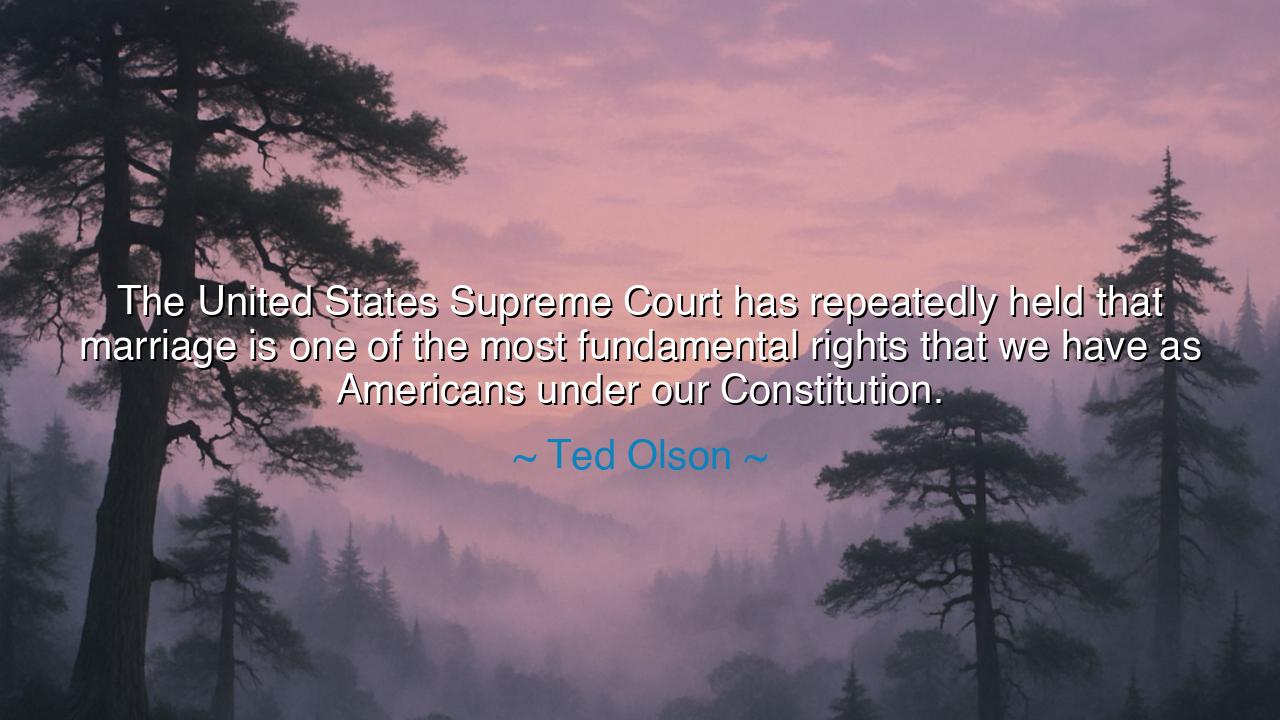
The United States Supreme Court has repeatedly held that marriage
The United States Supreme Court has repeatedly held that marriage is one of the most fundamental rights that we have as Americans under our Constitution.






Gather close, O children, and hear the words of Ted Olson, a man whose understanding of the laws that govern us calls us to reflect on one of the most sacred of human rights—the right to marriage. He said, "The United States Supreme Court has repeatedly held that marriage is one of the most fundamental rights that we have as Americans under our Constitution." These words ring with the resonance of justice, echoing through the halls of history, calling us to consider the deep and unbreakable bond that marriage represents in the fabric of society, and how it stands as a pillar of freedom, dignity, and equality.
What, then, is meant by the idea that marriage is one of the most fundamental rights of an individual, one so deeply rooted in the fabric of a nation’s Constitution? To understand this, we must look beyond the simple ceremony of joining two lives together and recognize that marriage is more than a contract; it is a declaration of freedom—the freedom to love, to form family, to express one’s identity in the deepest ways. It is the foundation upon which society is built, for through marriage, we create bonds of trust, stability, and love that shape the very heart of community. The Supreme Court, in its wisdom, has upheld marriage as a right that is fundamental to human dignity and personal liberty, for without the freedom to marry, how can one truly claim the full enjoyment of life and all its blessings?
Consider, O children, the ancient Greek concept of Eros, the god of love, who embodied the power of union between two souls. In Greek mythology, love was not a simple emotion, but a force that bound the universe together. Eros taught the Greeks that to love and to be loved was not merely a personal joy, but a fundamental part of one’s humanity, shaping the very order of existence. The right to love and to marry was, therefore, not to be denied, for it was as essential to life as the air we breathe, a truth that echoes in Olson’s words—that marriage is a fundamental right that ensures the fullest expression of one’s being. In marriage, we honor freedom, connection, and the deep human need to find unity with another.
In the history of America, the struggle for the right to marriage has been a long and difficult one. Think back to the Loving v. Virginia case in 1967, when the Supreme Court ruled that laws banning interracial marriage were unconstitutional. Richard and Mildred Loving, an interracial couple, were not just seeking to marry—they were seeking to honor their love and the right to do so without fear of legal retribution. The Supreme Court’s decision was a moment of profound justice, recognizing that the right to marry is not a privilege to be restricted by racial lines, but a fundamental right rooted in the principles of equality and human dignity. The Loving case exemplifies the very heart of Olson’s statement: marriage is not just a personal choice, but a right protected by the Constitution itself.
Ted Olson’s statement also calls us to remember that the right to marry extends beyond traditional norms and must include all who seek to form the sacred bond of marriage. In Obergefell v. Hodges, the Supreme Court affirmed that same-sex couples, too, are entitled to the right to marry, thus further solidifying that marriage is a fundamental right for all citizens, regardless of gender or sexual orientation. This decision was not just a victory for love, but a victory for equality, for freedom, and for the inherent dignity of every human being. The right to marry, as recognized by the highest court in the land, is a reflection of the country’s commitment to uphold the Constitutional principles of liberty and justice for all.
The lesson, O children, is clear and powerful: the right to marry is not just a matter of personal choice, but a matter of human dignity and freedom. It is a right enshrined in the very fabric of the Constitution, a right that cannot be denied by the laws of the land or the judgments of those who would seek to divide us. As Olson reminds us, the Supreme Court has repeatedly upheld marriage as fundamental, a right that is at the core of who we are as free people. To deny anyone the right to marry is to deny them their freedom and their equality, and we must stand vigilant in defending this right for all.
In your own lives, O children, take this wisdom into your hearts. Understand that the right to marry is a right for all, and that equality in love and in union is not just an ideal but a duty we must uphold. In all things, seek to honor the freedom and dignity of others, recognizing that their right to love, to marry, and to build family is as sacred as your own. Work toward a world where the bonds of marriage—whether between different races, different genders, or different orientations—are celebrated as a triumph of justice, and where every person’s right to form a union of love is honored by the law and by society. This is the path of truth, justice, and equality, and it is the path we must follow to ensure that every soul can walk freely in love and dignity.






AAdministratorAdministrator
Welcome, honored guests. Please leave a comment, we will respond soon